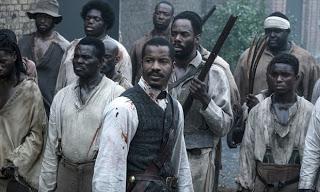 Few films rose and fell as quickly as The Birth of a Nation (2016), Nate Parker's troubled Nat Turner biopic. After a rapturous Sundance reception and record-setting $17.5 million deal with Fox Searchlight, it disappointed with lukewarm reviews and tepid box office. It certainly wasn't helped by the controversy surrounding resurfaced sexual assault charges against Parker, which dogged him at every interview and presser; a film invoking Black Lives Matter now unwittingly channeled arguments about rape culture. Thus one of 2016's event pictures deflated into just another period drama, tainted with ugly, extra-textual controversy.
Few films rose and fell as quickly as The Birth of a Nation (2016), Nate Parker's troubled Nat Turner biopic. After a rapturous Sundance reception and record-setting $17.5 million deal with Fox Searchlight, it disappointed with lukewarm reviews and tepid box office. It certainly wasn't helped by the controversy surrounding resurfaced sexual assault charges against Parker, which dogged him at every interview and presser; a film invoking Black Lives Matter now unwittingly channeled arguments about rape culture. Thus one of 2016's event pictures deflated into just another period drama, tainted with ugly, extra-textual controversy.After several years of slavery dramas, from the bleak despair of 12 Years a Slave to Django Unchained's revenge fantasies, The Birth of a Nation isn't so impactful as its reputation suggests. Parker the actor delivers a captivating performance, while filmmaker Parker provides flashes of brilliance and power, but the movie's more uneven than excellent.
Nat Turner (Nate Parker) grows up as a plantation slave in antebellum Virginia. Learning to read at an early age, he's recruited by master Samuel Turner (Armie Hammer) to preach Christianity to slaves in an effort to encourage submission. It backfires, as Turner's preaching grows more bellicose as he grows exposed to a broader swath of oppression. Finally, in 1831 he's driven to violence, inspiring a ferocious, though foredoomed slave revolt.
At its best, The Birth of a Nation offers powerful portraits of the South's "Peculiar Institution." Parker and photographer Elliot Davis stress the dinginess of 1830s Virginia, showing the slaveowners as cash-strapped bourgeoisie with airs rather than handsome plantation owners, a parade of ugly, grizzled faces and filthy clothes. The movie generates strength in its scenes of white cruelty, from slave auctions and rapes to lynchings and casual violence. Most effective is a montage of revenge killings scored to Billie Holliday's "Strange Fruit," with a tracking shot of hanged bodies (starting on a close-up of a butterfly on a boy's chest) both sickening and strangely beautiful.
Unfortunately, Parker can't resist ennobling his rather troubled antihero. Parker delivers thunderous orations and Bible verses while bathed in godly light, backed by Henry Jackman's portentous choral score. In its cheapest moment, Turner's driven to revenge by his wife's (Gabriele Union) rape as if chattel slavery isn't enough motivation! Birth doesn't shy away from Turner's atrocities (its central murders, in their shocking intimacy, recall the Australian race war epic The Chant of Jimmie Blacksmith) but it's too insistent on painting him as a messianic visionary to achieve the nuance one would hope.
Nate Parker, fortunately, gives a remarkable performance: he sells Turner's godly devotion, growing indignation and acceptance of rebellion with intelligence and charisma. The supporting cast, unfortunately, are less impressive. While Armie Hammer and Penelope Ann Miller tease some nuance of their benevolent-but-not-really slave owners, other white characters are racist gargoyles, while black characters are mostly bedmates, bullet fodder or recipients of Turner's wisdom.
Probably no movie could treat Nat Turner without taking sides or skirting controversy: rebels, especially slave insurrectionists like Turner, are rarely the saintly saviors Hollywood demands. That The Birth of a Nation celebrates Turner without praising his atrocities is commendable, yet it leads to an uneven film that feels more queasy than complex.

